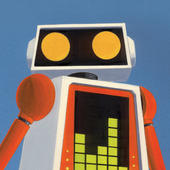Developed in the early 1980s by greedy video game tycoon William Jennings Wellworth as an expensive prototype robot capable of human feeling, Wolfgang was also extensively analog-programmed with an encyclopedic knowledge of the popular music of the era, with the idea of creating the world's first robot pop star, capable of writing hit songs.
Having developed some of the most influential titles of the newly-emerging video game industry (such as "Rocketship Rangers" and "Galaxy Battalion"), Wellworth turned his attention to robotics and artificial intelligence. Utilizing video game microchips in conjunction with the synthesizer and sequencing technologies of the age, Wellworth assembled a humanoid robot with the capacity to autonomously compose music.
Essentially force-fed huge libraries of The Human League, New Order and the like, it was hoped that Wolfgang would pay Wellworth back in kind in the form of huge record sales and royalties. Despite putting all the vast resources Wellworth had into the project, Wolfgang was not able to create under his cruel and cold hand. This failure cost Wellworth his fortune as well as his reputation. He was never heard from again.
Nearly 25 years later, renovations to convert the crumbling Wellworth Electronics factory in Brooklyn into luxury condominiums had rallied a group of young neighborhood activists to take action against what they saw as the impending gentrification of their poor artistic community. During a nighttime mission to vandalize the building, one of the activists discovered Wolfgang discarded in a dumpster amongst endless amounts of electronic waste.
With a thorough cleaning and a battery charge, Wolfgang became operational again. Developing special feelings for the young man who had provided rescue from the dumpster, Wolfgang had at last experienced a human emotion. That emotion was love.
This awakening allowed Wolfgang to begin composing music, just as Wellworth had intended. The man loved to dance, and Wolfgang enjoyed providing the beats. Soon Wolfgang would begin writing and performing songs as a show of bravado for the object of the robot's affection.
And some songs were written in private. As Wolfgang began to realize that a human can never truly love a robot, the music became a way to deal with the emotional sensory overload. Wolfgang's songs illustrate the experience of happiness and heartache, of the initial joy and eventual hopelessness that accompanies unrequited love.
